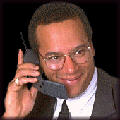| sponsor |
| sponsor |

| best on |
|
|

|
|
|
| 042:english:words | An Independent Educational Net Magazine | englishtimes.net |
|
news
|
society
|
business
|
leisure
|
travel
|
nature
|
activities
|
features
|
mailbox
|
english
|
| TELEPHONE VOCABULARY | front link help |
When you pick up a phone to make a call, you hear a dialling tone. You dial the number and, if everything is OK, you hear a ringing tone. The ringing tone is generated at the telephone exchange, not by the phone you are calling. If the other phone is busy, you hear an engaged tone, so you'll have to redial later. If there's a fault, you hear an unobtainable tone.
If you need to find a phone number, ask for directory enquiries. If you need help, ask for the operator. If you have a fault on your line, ask for the engineer.
If you get connected, or get through, you may be asked to wait, or be put on hold. Or, if a receptionist answers, they will put you through to the person you want to speak to.
If you can't hear properly, it's a bad line. If you get disconnected, you've been cut off. If there's been a storm, the lines may be down.
When your phone makes a noise, you can hear it ringing. You can use your main phone, or the extension in your bedroom. A wireless phone has a base station. The part you pick up to speak is called the handset.
You can leave a message on an answering machine or on computerised voice mail, so that someone can call you back.
| CULTURE TIP |
 |
 GREGG USING HIS MOBILE GREGG USING HIS MOBILE |
Over the years, the word telephone has been abbreviated to 'phone, and now to phone. A hand-held mobile phone is usually called a mobile.
Most people don't say that they'll telephone you. They say that they'll call you. This is a US use of the verb to call which has become international. It also has a noun form, as in to make a call. Here are some examples:
 I'll call you as soon as I get to the airport.
I'll call you as soon as I get to the airport.
 Give me a call after 11:00 on Wednesday.
Give me a call after 11:00 on Wednesday.
 Don't call me at work.
Don't call me at work.
 If anyone calls, ask them to ring back tomorrow.
If anyone calls, ask them to ring back tomorrow.
 Call the cinema and see if that Bruce Willis film is on tonight.
Call the cinema and see if that Bruce Willis film is on tonight.
 Before we leave work, I have to make a quick call home.
Before we leave work, I have to make a quick call home.
Old telephones had an electro-mechanical bell which would ring when someone called you. We still use the verb to ring, for calling someone. It also has a noun form, as in give me a ring. Here are some examples:
 I'll ring you in my lunch break.
I'll ring you in my lunch break.
 Give me a ring if you want to meet next week
Give me a ring if you want to meet next week
 Don't ring me too early.
Don't ring me too early.
 If anyone rings, I've gone to the post office.
If anyone rings, I've gone to the post office.
 Ring the theatre and see if there are seats for tomorrow.
Ring the theatre and see if there are seats for tomorrow.
 Before we leave work, I need to ring home.
Before we leave work, I need to ring home.
Also, old telephones had a circular number mechansism, called a dial. We still use the noun dial, as the verb to dial, for pressing buttons. Here are some examples:
 To call Technical Support, dial 020 7602 4107.
To call Technical Support, dial 020 7602 4107.
 In an emergency, dial 999.
In an emergency, dial 999.
In the Four Pillars Hotel in Witney, a sign in the Health Club said Emergency! To summon attention, dial zero, even though it was a push-button phone.
Copyright and Permission: Learning English, an on-line interactive multimedia experience for intermediate speakers who need to improve and develop their written and spoken English. Check out www.learningenglish.net.
The English Times
An independent educational internet magazine to help you learn English
www.englishtimes.net
Talking Technologies and Originators Copyright 2002